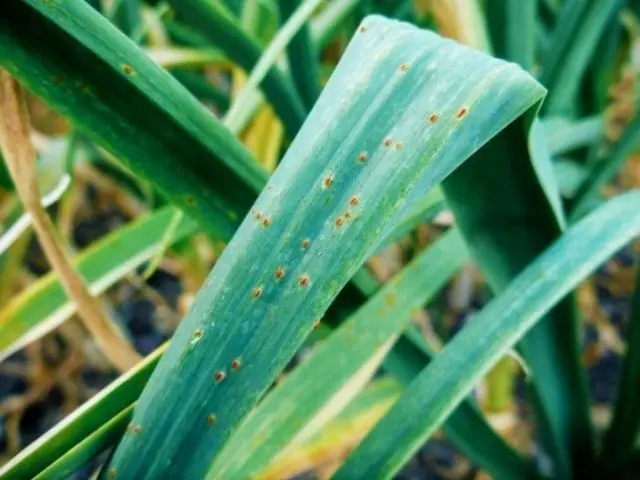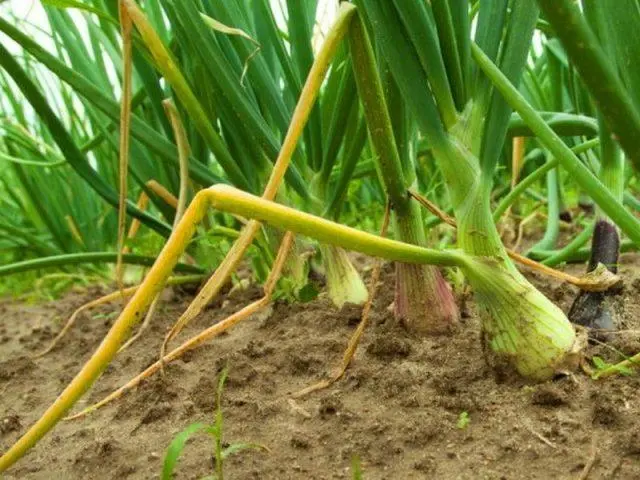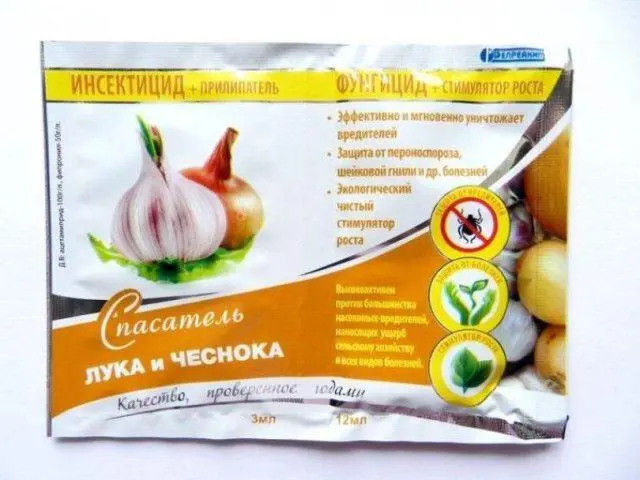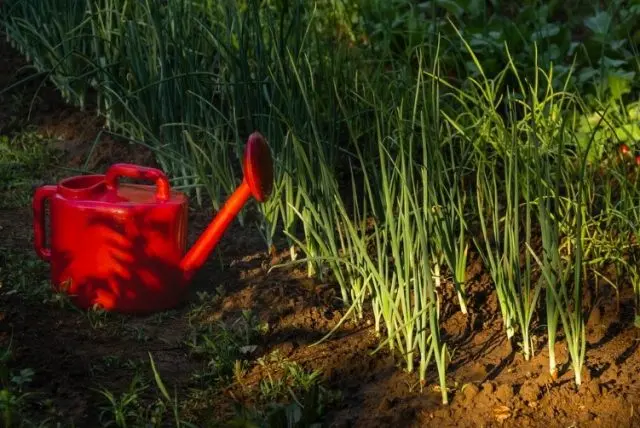Contents
Pathogenic fungi are the cause of many diseases in the plant world. Spores are easily spread through plantings at the slightest breath of wind. Agricultural technicians know measures to combat rust on garlic, aimed at eliminating a common fungal infection.

Rust often affects not only all varieties of garlic, but also leeks, shallots, turnips
Why does garlic rust?
Garlic is one of the popular vegetable crops grown by gardeners. A good harvest can be obtained if the agrotechnical conditions of cultivation are observed and the plantings are treated in a timely manner from pests and pathogens. The rust that struck the garlic is an insidious disease that leads the plant to death.
Spores of a harmful fungus do not die during wintering; they lurk until spring in the remains of old plants. With the onset of warm days, the infection is activated. Factors conducive to rust infection of garlic plantings are:
- High humidity coupled with cold weather. At low temperatures, spores carried by wind and rainwater fall on young shoots.
- Garden uncleaned in autumn. Plant residues are a haven for various kinds of mycotic infections.
- Non-observance of crop rotation.
Experienced vegetable growers know that if you place garlic and other crops of the bulbous family from year to year in the same area, then rust will definitely appear. Hence the recommendation: change the landing sites every two years.

The source of rust is a perennial onion, so garlic beds are placed away from it.
Symptoms of the onset of the disease
Rust causes significant damage to the plant. The disease leads to a violation of the absorption of nutrients and minerals, as a result of which garlic ceases to develop, its taste qualities undergo changes for the worse.
The asymptomatic period for rust infection lasts several weeks. At an early stage, whitish dots appear. As the disease develops, rusty spots on garlic leaves are the first to catch the eye. Yellowish, convex oval-shaped formations – pustules become brown over time. The spots gradually grow, foreign formations slow down the process of photosynthesis. Fungal spores develop in pustules and move to other parts of the plant.
Aftermath
When cultivating arrow varieties of garlic, symptoms of infection are noticeable on the stem. Damaged green feathers begin to dry and die off, causing the head to fail to form. The root system rots. Weakened plants give a poor harvest, in addition, the shelf life of the bulbs is significantly reduced.
In the last stages of the growing season, the spotting on the arrows becomes black. The spores in the pustules spread throughout the surrounding area, infecting other vegetable and berry crops.
What to do if the leaves of garlic are covered with rust
Successful rust control requires early detection of the disease by periodically checking the plantings. The first signs of infection are easily detected on the arrows, if you carefully examine them. The appearance of yellowish dots signals the need for medical procedures.
Chemical preparations for rust on garlic
Planting treatment begins with the removal of infected arrows. After harvesting, the feathers of garlic, covered with spots, must be burned. Having eliminated the diseased parts, it is necessary to treat the plants with fungicides, the active component of which is sulfur. Among the effective preparations against rust on vegetables:
- Topaz;
- Strobe;
- Quadris.
The last of the mentioned means is especially recommended for use by agricultural technicians. Quadris shows a stable result in the treatment of rust. Gardeners consider traditional fungicides to be effective preparations used in the improvement of garlic plantings:
- Fitosporin-M;
- Oksikhom;
- RAW.
These remedies help get rid of not only rust. The drugs help to cure another disease that is no less dangerous for garden crops – peronosporosis.
Effective in the fight against fungus biological compounds. Farmers recommend:
- Gamair;
- Alirin-B.
Biological agents are more expensive than conventional fungicides. But they are more environmentally friendly, do not harm the environment.
Dilution of drugs should be carried out in accordance with the attached instructions. Treatment of plantings from rust is carried out on the day when the working solution is prepared. If timely measures are taken, the formation of spores stops, reducing the risk of infection of garlic plantings. Secondary processing is planned in about a week.

The Onion and Garlic Rescuer contains, in addition to the fungicide, an insectoacaricide and a growth regulator.
Folk remedies
The centuries-old experience of gardening has led to the development of recipes for remedies that are effective in the fight against fungal plant infections. Popular folk remedies in the treatment of planting garlic are:
- Ammonia diluted in water, calculated as a tablespoon per 10 liters of water. The solution should be poured under the root so as not to damage the greens. Another way is fine spraying of the leaves. The use of ammonia allows, in addition to treatment, to carry out nitrogen fertilizing.
- Tar soap. To obtain a working solution, a grated pack of soap is diluted in a bucket of water, stirring thoroughly, and the garden is watered.
- Baking soda. A popular household substance is one of the tools used to rid vegetable crops of rust. To prepare the solution, a glass of soda is diluted in 10 liters of water. Watering garlic is also carried out under the root.
If the infection has caused significant damage to the plantings, it is recommended to use Bordeaux mixture. Copper sulphate slows down pathological processes in plant tissues and, accordingly, eliminates the spread of spores to garlic plantings and other beds with vegetables. The main signs of rust and how to deal with infection are presented in the video:
Preventive treatment of garlic from rust
The main measure in the fight against rust on garlic is the implementation of preventive measures. To prevent infection, agricultural technology recommends:
- In autumn, carry out a quality cleaning in the garden. Destruction of the remains of rotting plants and deep digging of beds contribute to the elimination of fungal spores.
- Process planting material. The most effective remedy in the fight against the fungus is the rays of the sun, so the garlic cloves are laid out on a clean cloth or paper and kept outdoors in a well-lit place.
- Spray the material intended for planting with a solution of furacilin. To prepare a remedy, ten tablets of the drug are dissolved in settled water.
The use of a 40% formalin solution gives excellent results in the preparation of inoculum. The cloves, cleaned of excess husks, are moistened with the product and placed for ten minutes in a canvas bag. Then everything is put in a plastic bag and kept for two hours. In a harsh chemical environment without air access, all infectious agents die.
In order to combat rust, thickening of landings should not be allowed. Reduced air circulation is a predisposing factor for the development of fungus. The optimal distance between the teeth when planting is 6 cm.

cool weather, do not water the garlic in the evening, creating an ideal environment for the fungus
Conclusion
Measures to combat rust on garlic can prevent the spread of infection and preserve the crop. Ways of processing plantings are available even to novice gardeners. Timely organized preventive measures are an important condition for plant protection.









